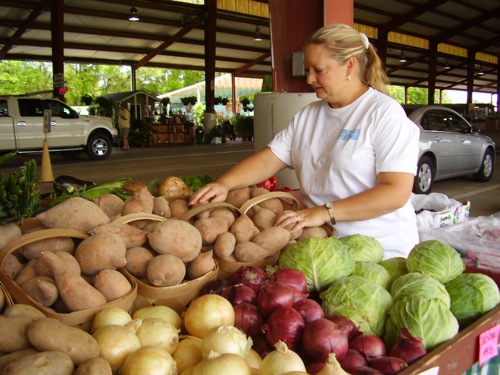
Courtesy Pee Dee State Farmers Market
South Carolina Farmers Markets and Farm Stands
South Carolina is known for its produce, and come summertime, you won’t find prettier, fresher strawberries, watermelons, peaches or tomatoes anywhere else. And thanks to the state’s Certified South Carolina Grown program, group-accessible farmers markets, roadside markets and farm stands abound, from Florence to Filbert.
“More and more, people want to know who grew their food,” said Martin Eubanks, South Carolina’s assistant commissioner of agriculture. “Farmers markets allow people that face-to-face contact.”
A 55-acre attraction in Florence a mile off I-95 is a case in point.
“We were established as a central market place to move South Carolina-grown produce from the farmer’s field to the consumer as fresh as possible,” said Betty Boykin, office manager for the Pee Dee State Farmers Market, a motorcoach-friendly stop with a 45,000-square-foot, 68-shed drive-through.
The market also houses two family-run nurseries with flowers and plants, potterymaking demonstrations and a new seafood cafe.
In the hamlet of Filbert in upstate’s York County, author and storyteller Dori Sanders, the granddaughter of a freed slave, still helps run one of the oldest African-American farms in the region. The family owns 12 acres of peach trees, and Sanders, nearly 80, runs an old-fashioned, tin-roofed roadside stand.
“We’re the only peach farm without an air-conditioned building, so we have to pick our peaches every day,” Sanders said. “Therefore, they’re sweeter because they come directly from the tree to you.”
A joyful ball of energy, Sanders welcomes groups to stop and taste her peaches, stretch their legs on a farm walk and listen to her weave entertaining stories.
www.scda.sc.gov
www.dorisanders.com
Farm to Table
With the recent increase of diners’ interest in local food, restaurants in North and South Carolina embraced the concept of using more local, fresh-as-possible produce, meats, seafood, and artisanal breads and cheeses. Destinations that welcome groups are no exception.
“We’re one of 17 green-certified restaurants in Asheville,” said Kevin Westmoreland, co-owner of the Corner Kitchen in Biltmore Village, which has lovely views of historic homes. “We find that the farm-to-table or farm-to-fork concept is important to a lot of customers to the extent that if you’re not doing it, you’re not in the game.”
Open seven days a week, his restaurant serves all three daily meals and can arrange a breakfast buffet, boxed lunches and even a spread of North Carolina western barbecue.
“Much of our produce is grown at a farm eight miles away, and our herbs are picked fresh from our own garden,” said Westmoreland.
Opened in 2007, the American Grocery Restaurant in Greenville, South Carolina, takes fresh and local to a new level. Owners Joe C. Clark and his wife, Darlene, source 85 to 90 percent of their food as locally as possible. The menu features seasonal produce delivered daily to the back door by local farmers. A recent entree was local lamb pasta primavera, asparagus, green garlic, spring peas and wild mushrooms.
“If I’m getting my food locally, I know where it’s grown” said Clark. “I know how it’s grown. I know these guys are putting as much effort into raising their product as I am in getting it on the table. And it supports my local economy. I’m investing in my own neighbors.”
Like the Corner Kitchen, Clark’s group buyout capacity is 50.










